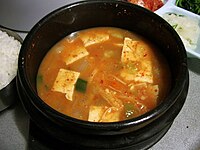Doenjang girl


Doenjang girl or doenjang woman (Korean: 된장녀; RR: doenjang nyeo) is a pejorative neologism used in South Korea to criticize women who "[scrimp] on essentials so they can over-spend on conspicuous luxuries".[1] Doenjang is Korean fermented soybean paste.[2] The term mocks a woman for eating a cheap meal (doenjang-jjigae is one of the cheapest meals in Korea) so she can buy something expensive.[3] A large part of the song "Gangnam Style" is a parody of this stereotype.[1][3]
The term first entered the language after Korea's early-2000s economic upswing.[4] According to Jee Eun Regina Song, the concept of this woman is "best exemplified by the Starbucks cup in her hand".[5] In South Korea, Starbucks symbolizes aspirational wealth and drinking Starbucks coffee is a status symbol; Seoul as of 2015 had more franchises than any other city in the world.[3] Coffee after 1999 became a symbol of class.[3]
According to the BBC, the term is inherently sexist;[4] according to Song, the issues are both of gender and class.[5] The BBC said that the term refers to the idea that "no matter how many Chanel bags she buys, she'll never be able to disguise her 'Korean-ness', and that this kind of spending was something to be mocked."[4] There is a male equivalent in the form of doenjang nam (된장남), though it is less used than its female counterpart.[6]
References
[edit]- ^ a b Fisher, Max (23 August 2012). "Gangnam Style, Dissected: The Subversive Message Within South Korea's Music Video Sensation". The Atlantic. Retrieved 2012-09-17.
- ^ Doenjang[permanent dead link] at doopedia (in Korean)
- ^ a b c d Rothman, Lauren (19 January 2015). "Korean Women Are Starving Themselves to Afford a Cup of Coffee". Vice. Retrieved 2022-01-25.
- ^ a b c Galer, Sophia Smith (8 April 2021). "The languages with built-in sexism". BBC. Retrieved 2022-01-24.
- ^ a b Song, Jee Eun Regina (Fall 2014). "The Soybean Paste Girl: The Cultural and Gender Politics of Coffee Consumption in Contemporary South Korea". Journal of Korean Studies. 19 (2): 429–448. doi:10.1353/jks.2014.0026. ISSN 2158-1665.
- ^ Lee, Jeong-bok. [우리말 톺아보기] ‘김치녀’에서 ‘검찰춘장’까지 (in Korean). Hankook Ilbo. Retrieved 2024-03-16 – via Naver.
